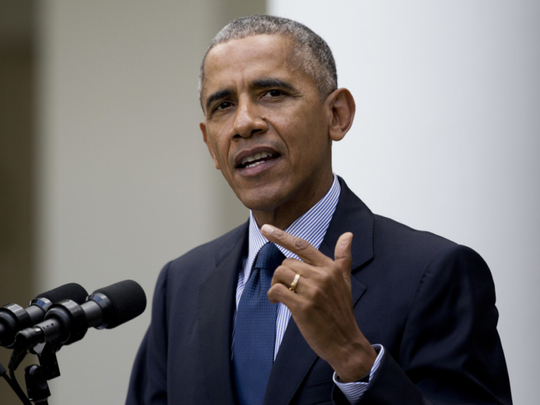
Does the United States still have the ability — or the will — to be the undisputed global leader, a role it has held since the Second World War? It’s a question to be answered soon by members of the US Congress as they approve or reject an initiative to give the US expanded access to 11 countries that represent more than a quarter of the world’s trade, while levelling the playing field for US workers and businesses.
How they vote on the Trans-Pacific Partnership (TPP) trade agreement will affect the course of America’s security, prosperity and global influence for the rest of the 21st century and determine whether the country will advance or retreat from its leadership role at a time of worldwide turmoil and uncertainty.
For me, the only common-sense direction is forward, because trade is the foundation of peace. Not only will the TPP promote peace and stability in the Asia-Pacific region, but also it will help maintain America’s essential strength in that hemisphere at a time of increased Chinese and Russian assertiveness.
Since the Second World War, the US has maintained its global leadership by building alliances that helped it fulfil its most important responsibility — protecting Americans militarily and economically — and then sharing those responsibilities and protections with its allied democracies. “Leader of the Free World” was more than a motto that the US proudly wore in the Cold War and beyond; it was America’s pledge to the world’s democracies and repressed people alike that the US would never let them down.
That’s why congressional approval of the TPP agreement is so essential to the US’ continued leadership across the world, as well as to its security at home.
Don’t be fooled by divisive talk in the presidential campaign that the TPP is only a debate about trade. At its very core, this agreement is about making sure the US continues to strengthen its essential alliances and is willing to sustain its standing as the global leader — something the US has done for more than half a century.
While China and Russia — and dangerous client states such as North Korea and Iran — jockey to outmanoeuvre everyone else and gain a dominant hand for their global schemes, there are fast-growing, independent nations looking to partner with the US and thereby bring their strategic, economic and political values into alignment with that of the US. That list begins with the initial TPP partners, but as many as 10 additional Asia-Pacific economies have expressed interest in joining.
Most aggressive rivals
The last thing America needs is for these thriving markets to come to believe they can’t count on US support, pushing them instead into economic and geopolitical relationships with China or Russia. In the event of America’s inaction and loss of resolve, the US will surrender global leadership to its most aggressive rivals who have the most to gain: Russian President Vladimir Putin and Chinese President Xi Jinping.
That’s why the TPP agreement enjoys full-throated, bipartisan support from America’s most respected national-security leaders, including former defence secretaries Robert Gates, Leon Panetta and Donald Rumsfeld and former secretaries of state Colin Powell, Madeleine Albright and James Baker.
They echo the stance of former president Ronald Reagan, who had it right when he said: “The freer the flow of world trade, the stronger the tides of human progress and peace among nations.” Reagan knew that when people trade together, it binds them together and promotes peace.
As a governor and former member of Congress who served for 18 years on the House Armed Services Committee, I am convinced that the TPP agreement will strengthen those alliances, helping attain the peace and progress that Reagan spoke of and achieved through his own insistence on US leadership and resolve.
America cannot turn its back on that legacy or abandon this opportunity, because expanding trade is about more than growing its economy — it’s also about ensuring America’s national security and asserting its willingness to stand tall against those who wish it ill.
It’s been more than 250 days since these 11 countries came together to sign the TPP agreement. As each new day passes, Americans should be concerned that the world’s doubts grow stronger about America’s willingness and ability to continue its historic role. It’s time for members of the Congress to put aside partisan politics, resolve their differences and ratify the deal. Their vote will send a message to the world that the US is the global leader — today and forever.
— Washington Post
John R. Kasich is an American politician and currently the Republican governor of Ohio.








